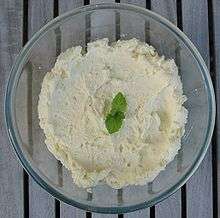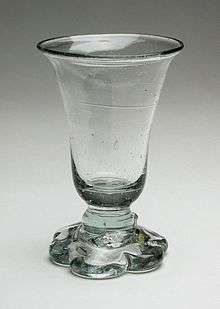Definify.com
Webster 1913 Edition
Syllabub
Webster 1828 Edition
Syllabub
SYL'LABUB
,Noun.
Definition 2026
syllabub
syllabub
English


A late-18th-century glass for serving syllabub or jelly manufactured in the United States (probably Pennsylvania), from the collection of the Los Angeles County Museum of Art, Los Angeles, California
Alternative forms
Noun
syllabub (plural syllabubs)
- A drink dating back to the 16th century consisting primarily of milk curdled with an alcoholic beverage or some acid such as lemon juice, which is usually then sweetened and spiced. [from 16th c.]
- 1769, Elizabeth Raffald, “Observations on Making Decorations for a Table”, in The Experienced English House-keeper, for the Use and Ease of Ladies, House-keepers, Cooks, &c. Wrote Purely from Practice, and Dedicated to the Hon. Lady Elizabeth Warburton, whom the Author Lately Served as House-keeper. Consisting of near 800 Original Receipts, most of which have Never Appeared in Print. [...], Manchester: Printed by J. Harrop, for the author, and sold by Messrs. Fletcher and Anderson, in St. Paul's Church-yard, London; and by Eliz. Raffald, Confectioner, near the Exchange, Manchester, OCLC 719441895, pages 183–184:
- Whip Syllabubs. Take a Pint of thin Cream, rub a Lump of Loaf Sugar on the Out-ſide of a Lemon, and ſweeten it to your Taſte, then put in the Juice of a Lemon, and a Glaſs of Madeira Wine, or French Brandy, mill it to a Froth with a Chocolate Mill, and take it off as it riſes, and lay it upon a Hair Sieve, then fill one half of your Poſſet Glaſſes, a little more than half full with White Wine, and the other half of your Glaſſes a little more than half full of Red Wine, then lay on your Froth as high as you can, but obſerve that it is well drained on your Sieve, or it will mix with your Wine, and ſpoil your Syllabubs.
- 1800, H. Glass [Hannah Glasse]; Maria Wilson, “Syllabubs, Blanc-mange, Flummery, &c.”, in The Complete Confectioner; or, Housekeeper's Guide: To a Simple and Speedy Method of Understanding the Whole Art of Confectionary; [...], London: Printed by J. W. Myers, No. 2, Paternoster-row, London, for West and Hughes, No. 40, Paternoster-row, OCLC 642210949, pages 184–185:
- To Make a Syllabub under the Cow. Put a bottle of either red or white wine, ale, or cyder, into a china bowl, sweeten it with sugar, and grate in some nutmeg; then hold it under the cow, and milk into it till it has a fine froth at the top; strew over it a handful of currants, clean washed and picked, and plumped before the fire. You may make this syllabub at home, by having new milk made as warm as from the cow, and pouring it out of a tea pot, or any other vessel with a spout, holding your hand very high.
- 1824, “a lady” [Maria Eliza Ketelby Rundell], “London Syllabub”, in A New System of Domestic Cookery; Formed upon Principles of Economy: and Adapted to the Use of Private Families, new corr. edition, London: John Murray, Albemarle-Street, OCLC 15055519, page 286:
- London Syllabub. Put a pint and a half of port or white wine into a bowl, nutmeg grated, and a good deal of sugar, then milk into it near two quarts of milk, frothed up. If the wine be not rather sharp, it will require more for this quantity of milk. In Devonshire clouted cream is put on the top, and pounded cinnamon and sugar.
- 1860 July, Thomas Hughes, “Tom Brown at Oxford. Chapter XXIII. The Englebourn Constable.”, in David Masson, editor, Macmillan's Magazine, volume II, number 9, Cambridge: Macmillan and Co. and 23, Henrietta Street, Covent Garden, OCLC 427357463, page 211, column 2:
- [A]s small boys, we pelt one another and the village school-girls and our nursemaids and young lady cousins with they hay, till, hot and weary, we retire to tea or syllabub beneath the shade of some great oak or elm standing up like a monarch out of the fair pasture; […]
- 1870, “Una” [pseudonym; Mary Anne McMullen Ford], “The Departure”, in Echoes of the Past from a Retired Hamlet. A Tale Founded on Fact, London: Hatchards, OCLC 847352, page 14:
- [H]is kind mother, when she fancied the croquet was flagging, thought of a sillabub—and lo! in walked a meek looking cow, adorned with flowers, and furnished the party with a most fragrant and most refreshing draught.
-
- Also everlasting syllabub or solid syllabub: a dessert pudding derived from the drink. [from 16th c.]
- c. 1537, Thersites; published in Joseph Haslewood, editor, Two Interludes: Jack Jugler and Thersytes, Kent: Printed at the private Press of Lee Priory; by John Warwick, 1820, OCLC 32861772, page 65:
- Mother by hys sonne he hathe sende me a letter / Promysynge hereafter to be to vs better / And you and I with my greate clubbe / Muste walke to him and eate a solybubbe / and we shall make merye / and synge tyrle on the berye […]
- 1800, H. Glass [Hannah Glasse]; Maria Wilson, “Syllabubs, Blanc-mange, Flummery, &c.”, in The Complete Confectioner; or, Housekeeper's Guide: To a Simple and Speedy Method of Understanding the Whole Art of Confectionary; [...], London: Printed by J. W. Myers, No. 2, Paternoster-row, London, for West and Hughes, No. 40, Paternoster-row, OCLC 642210949, pages 183–184:
- To make Everlasting Syllabubs. Take three pints of the thickest and sweetest cream you can get, a pint of rhenish, half a pint of sack, three lemons, near a pound of double refined sugar, beat and sift your sugar, and put it to the cream; grate off the yellow rind of three lemons, put that in, and squeeze the juice of the three lemons into your wine; put that to the cream, beat all together with a whisk just half an hour, then take it up all together with a spoon, and fill your glasses.
- 1824, “a lady” [Maria Eliza Ketelby Rundell], “Everlasting, or Solid, Syllabubs”, in A New System of Domestic Cookery; Formed upon Principles of Economy: and Adapted to the Use of Private Families, new corr. edition, London: John Murray, Albemarle-Street, OCLC 15055519, page 287:
- Everlasting, or Solid, Syllabubs. Mix a quart of thick raw cream, one pound of refined sugar, a pint and a half of fine raisin wine, in a deep pan; put to it the grated peel and the juice of three lemons. Beat, or whisk it one way, half an hour; then put it on a sieve with a bit of muslin laid smooth in the shallow end till next day. Put it in glasses. It will keep good, in a cool place, ten days.
- 1873 December 6, “A London Pilgrimage among the Boarding-Houses. VI. An Artistic Shelter.”, in Charles Dickens, editor, All the Year Round. A Weekly Journal, volume XI, number 262, London: Published at No. 26, Wellington Street; and by Messrs. Chapman & Hall, 193, Piccadilly, published 1874, OCLC 29960472, page 135, column 2:
- "Oh, I do dote on custard," remarks Mrs. Goram, with a mincing smirk, "it is such an improvement to a tart." / "I dote on syllabub," interposed Miss Jemima, sentimentally.
- 1957 November, Agatha Christie, 4.50 from Paddington, London: Published for the Crime Club by Collins, OCLC 937213793:
- Mushroom soup. Curried chicken and rice. Syllabubs. A savoury of chicken livers and bacon.
- c. 1537, Thersites; published in Joseph Haslewood, editor, Two Interludes: Jack Jugler and Thersytes, Kent: Printed at the private Press of Lee Priory; by John Warwick, 1820, OCLC 32861772, page 65:
- (figuratively) Something lacking substance; something frothy, insubstantial, or lightweight.
- 1831 February 4, Rowland Hill; Edwin Sidney, “Letters of Mr. Rowland Hill”, in The Life of the Rev. Rowland Hill, A.M., London: Baldwin & Cradock, Paternoster Row, published 1834, page 367:
- I like Paul's plain style best. Better to feed the appetite of the hungry, than to tickle the fancies of the whimsical. This breed of preachers are apt soon to preach themselves out of breath, and come to nothing. May you and I never be the retailers of such whipt-syllabub divinity—better keep a cook's-shop to satisfy the craving appetite, than a confectioner's-shop to regale the depraved appetite of the dainty. Good brown-bread preaching is the best after all.
-
Usage notes
Not to be confused with syllabus.